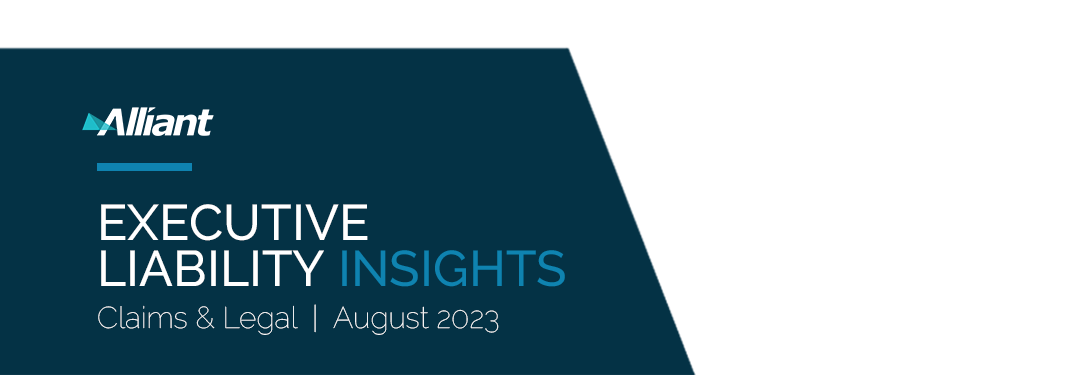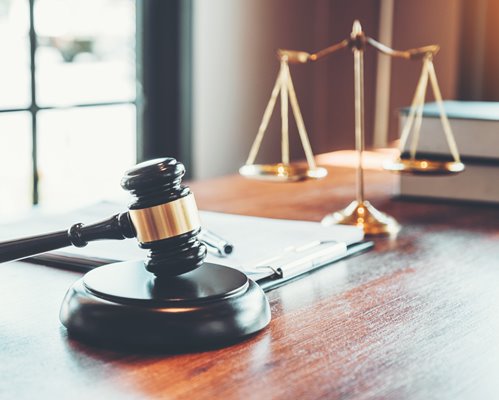
EMPLOYMENT CORNER
GEORGIA APPELLATE COURT CONFIRMS EEOC CHARGES AND RESULTING LAWSUIT ARE CLAIMS “MADE OR BROUGHT” BEFORE APPLICABLE POLICY PERIOD
PMTD Rests., LLC v. Houston Cas. Co., 2023 WL 4488189 (11th Cir. July 12, 2023)


Applying Georgia law, the U.S. Court of Appeals for the Eleventh Circuit affirmed the lower court’s ruling that an employee’s filing of a charge with the EEOC constitutes an “administrative proceeding” and, thus, a “claim” under the policy’s definition. Therefore, the EEOC proceeding and a subsequent lawsuit would be deemed claims arising from one insured event and considered to have been made at the time of the EEOC charges, before the relevant policy’s inception.
A former restaurant employee filed a Charge of Discrimination with the U.S. Equal Employment Opportunity Commission (“EEOC”) against their employer. Several months later, the same employee filed another EEOC charge against the same employer for discrimination. The following year, the employee filed suit against the restaurant. Shortly after the suit was filed, the restaurant first provided notice to its employment practices liability (“EPL”) insurer under the policy in place at the time.
The insurer denied coverage on the grounds that there was no claim “made or brought” during the applicable policy period. After prevailing at trial in the underlying matter, the restaurant filed an action against its insurer seeking reimbursement for its defense costs in connection with the EEOC charges and the lawsuit.
The court held that because both EEOC charges and the lawsuit were brought by the same claimant, the matters were considered “one insured event,” and were therefore deemed “made or brought” on the date of the first EEOC charge, before the inception of policy period under which the suit was noticed. Because there was no claim “made or brought” during the policy period, the restaurant was not entitled to coverage under its EPL policy.
On appeal, the court considered the ordinary meaning of the phrase, “administrative proceeding,” which encompasses an agency’s investigation. The court held that “[b]ecause a charge of discrimination filed with the EEOC triggers an EEOC investigation into the alleged acts of discrimination, the filing of an EEOC charge qualifies as a ‘claim’ under the Policy.” As a result, the claim was not first made during the policy period, and the lower court ruling in favor of the insurer was upheld.
The Takeaway
Timely reporting of any EEOC charge (and not just the lawsuit) would likely have avoided this coverage dispute and the negative outcome for the insured. It is equally important to ensure timely reporting of demands, attorney letters, and other correspondence from claimants or their representatives. Any written communication that alleges a wrongful act and demands monetary or non-monetary relief is likely enough to trigger a claim and should be reported as such, to avoid any prejudice to potential coverage.
CALIFORNIA COURTS EXPAND THE REACH OF THE LABOR CODE, LEAVING EMPLOYERS WITH MORE POTENTIAL LIABILITY
People ex rel. Gracia-Brower v. Kolla’s Inc., 14 Cal. 5th 719 (Cal, May 22, 2023)


In a unanimous decision, the California Supreme Court held that “a protected disclosure under Section 1102.5(b) encompasses reports or complaints of a violation made to an employer . . . even if the recipient already knows of the violation.” The decision expands the definition of “disclosure” to provide more protection to whistleblowers from retaliation.
In the underlying matter, the employee filed a complaint with their employer regarding wages owed for three prior shifts. The employer terminated the employee and threatened to report them to immigration authorities. The employee then filed a complaint with the California Labor Commissioner in the Division of Labor Standards Enforcement (the “DLSE”). The DLSE proposed the remedies of payment of lost wages, reinstatement, and payment of civil penalties. However, the employer rejected DLSE’s early resolution, which caused the Labor Commissioner to file a suit for various California Labor Code violations, including Section 1102.5.
The lower courts ruled against the DLSE and found that the term “disclose” required “the revelation of something new, or at least believed by the discloser to be new, to the person or agency to whom the disclosure is made.” Thus, the employee’s complaint of unlawful activity to their employer was not a “disclosure” due to the employer’s awareness of the wrongdoing.
However, the reviewing court reasoned that such a definition of “disclose” was too narrow and inconsistent. The court stated that such an interpretation would amount to a “first known report rule, which would exclude from the whistleblower law’s protections an employee who was the second to report workplace misconduct—regardless of whether the employer had prior knowledge. As a result, the court held that the term “disclose” also means “bringing into view in a particular context a type of information to which the disclosure tends to have special access.”
The Takeaway
This ruling means that the California whistleblower statute now aligns with the federal Whistleblower Protection Act. Thus, employers should continue to take reports of misconduct seriously by investigating and re-evaluating the appropriateness of taking adverse action against the reporting employee. Such protocol should be in place regardless of whether the employee was the first to make a given report or whether the employer has known of the reported information.